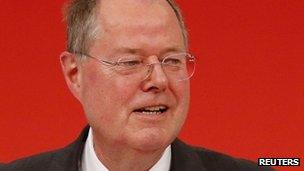Q&A: German parliamentary election
- Published
Stephen Evans explains how the Bundestag election works
On 22 September, German voters will go to the polls to elect a new Bundestag, the country's lower house of parliament.
Chancellor Angela Merkel's centre-right Christian Democrats and their allies are defending a majority of 40 in the current 620-seat assembly.
Who are the key players?

Mr Steinbrueck and the SPD have focused on social justice
What are the main issues?
German voters on the issues that matter most to them ahead of 22 September's elections.
How does the system work?

Recent polls credit the CDU/CSU with about 40% of the vote
Which outcomes are most likely?
BBC Monitoring, external reports and analyses news from TV, radio, web and print media around the world. For more reports from BBC Monitoring, click here. You can follow BBC Monitoring on Twitter , externaland Facebook, external.